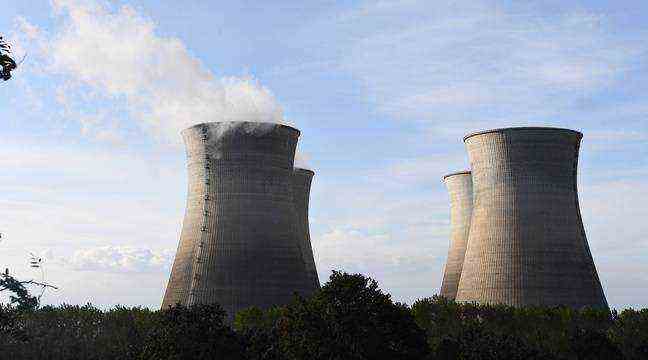Price pressures ahead. A corrosion problem on the safety system of French nuclear reactors has spread to at least one other reactor, a new setback that falls badly when the electricity supply is tight and the sector scrutinized as never before. These problems prompted the French group EDF to reduce its nuclear electricity production forecast for 2022 “to 300 – 330 TWh, against 330 – 360 TWh”, due to “the extension of the shutdown period of five reactors in the fleet French nuclear power plant from EDF,” the group announced in a press release on Thursday evening.
Among them, a reactor at the Penly power plant (Seine-Maritime) is now also affected by this defect, which until now had only affected more powerful and recent reactors. “The defects that have been observed on the latest generation reactors have been observed on another reactor”, that of Penly 1, which is already shut down, Karine Herviou, deputy director general of the Institute for Radiation Protection and Nuclear Safety (IRSN). The problem had so far only been identified on 1,450 megawatt reactors. The fault detected at Penly 1, a 1,300 MW reactor, is the first to concern another family of reactors.
Same phenomenon as before
EDF had announced in mid-December the precautionary shutdown of the two reactors of the Chooz power plant (Ardennes) to check for possible faults in its emergency cooling circuit, after the detection of faults in Civaux (Vienne), a another unit of the same model.
The group has since announced that one of the Chooz reactors was indeed affected by the same problem. The second is still under investigation.
The problem identified at Penly “would also be due to a stress corrosion phenomenon, that is to say the same phenomenon that was detected” on the 1,450 MW reactors, said Karine Herviou, referring to “a defect in the ‘order of a millimeter’.
The shutdown of the four reactors at Civaux and Chooz in the middle of December had deprived France of 10% of its nuclear capacity and caused electricity prices to jump, already very high, on the market.
“The realization of the controls, the instruction of technical solutions and their deployment lead EDF to extend the shutdown of the reactors of Civaux 1, Civaux 2, Chooz 1, Chooz 2 and Penly 1”, warned Thursday evening the public group of energy.
Problems to come elsewhere?
The RTE network manager has recently increased its level of vigilance on the supply of electricity to France while the availability of the nuclear fleet, also turned upside down by the pandemic, is at its lowest. France, which derives the vast majority of its electricity from nuclear power, had 10 out of 56 reactors unavailable on Thursday and was deprived of 20% of its capacity, at a time when consumption is high with the drop in temperatures.
The question now is whether other reactors in the French fleet are affected by this corrosion problem. “We don’t know if there aren’t problems elsewhere. EDF is in the process of reviewing all the recordings” of the checks carried out in the past on the park, indicated Karine Herviou.
“It is impossible to exclude that other reactors of the 1,300 MW level will be affected”, judged Yves Marignac, nuclear expert from the NégaWatt association.
“This poses a difficult problem for the authorities, which is to know if we apply the same logic (as for the 1,450 MW reactors) and we close the reactors preventively or if we favor electrical safety”, he said. added. Because “closing more 1,300 MW reactors would inevitably lead to supply disruptions”.
The new problems revealed on Thursday come at a time when France is wondering about its energy future amid rising concerns about climate change. Nuclear power is one of the divisive themes of the presidential campaign, with candidates in favor of this energy (especially on the right, on the far right, but also in the PCF) and others hostile (LFI and EELV in particular).
President Emmanuel Macron, who has not yet declared himself a candidate for a second term, announced in November that France would launch a new program to build nuclear reactors. It is currently building only one new generation, the Flamanville EPR (Manche), which has experienced many delays. The last one has just been announced on Wednesday: the loading of fuel has been postponed from the end of 2022 to the second quarter of 2023, for an increased bill of 300 million euros.

